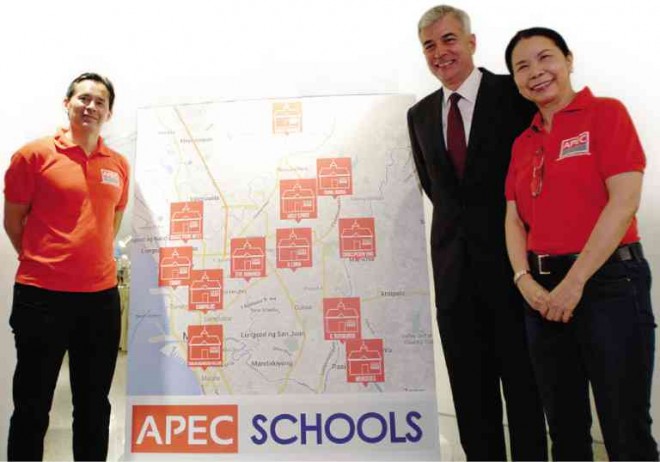Here come the new high schools

HIGH ON EDUCATION Alfredo Ayala, Fernando Zobel de Ayala and Beth Lui launch their affordable private high schools. Photo by Romy Homillada
This coming school year, Grade 7 students can enroll in a private school for only P23,000 a year, a fourth of what other schools charge for just a semester.
More importantly, these affordable private schools in Metro Manila are designed to better prepare high school students for employment.
The new chain is under the management of Affordable Private Education Center (Apec), a joint venture between Ayala Corp. and Pearson. Ayala is one of the largest, most diversified corporations in the country; Pearson is an education company based in the United Kingdom.
“We aim to bridge the gap between industry and academe by working hand in hand with employers, the HR (human resources department) of large companies and educators from high schools and colleges to ensure that the students are ready for the real world,” said Alfredo Ayala, president of LiveIt Global Services Management Institute and Apec chair.
School to job
Article continues after this advertisementThe Apec schools are focusing not only on essential academics but also professional skills, such as critical thinking and problem solving, leadership development and values, such as determination, integrity and compassion, according to Ayala.
Article continues after this advertisement“I feel that in the private sector, we have a unique skill because we can see things from the industry side. We know the people we are hiring, the skills needed and how people have to be prepared,” Fernando Zobel de Ayala, Ayala’s president and chief operating officer, said at the Apec launch.
Beth Lui, Apec chief executive officer, said, “Our goal is to provide a school that is near the community and brings the best of education through excellent teacher training [and] a curriculum that is benchmarked against international standards and, at the same time, follows the Department of Education curriculum.”
The advanced curriculum was developed with Pearson, whose wholly owned subsidiary, Pearson Affordable Learning Fund, provided support in operations, pedagogy, teacher development and training.
Aside from mathematics, science, English, Filipino, social studies, MAPEH (music, arts, physical education and health) and TLE (technology and livelihood education), Apec also offers “life labs.”
Monette Sabio, Apec director for teaching, explained that life labs is a “problem-based” subject. Students identify a problem in the community and search for solutions throughout the semester through research and interviews.
One group can choose health problems in the community, she said.
“We want education to really be closer to the students in the sense that it is experiential,” she said.
Subjects are taught the whole day to make the discussion of topics more “in-depth.”
“If you have math, you’ll have math throughout the day,” Sabio said. “At the end of the day, the students leave having really assimilated and understood the lessons.”
Apec is opening 11 schools in the cities of Quezon, Pasig, Marikina, Manila and Caloocan in time for the July start of school year 2014-2015.
In preparation for the rollout of the new chain, Apec launched a pilot class of 70 seventh and eighth graders at Emilio Aguinaldo College (EAC), Lui said.
Private attraction
According to Lui, 60 percent of the batch at EAC were transferees from public schools. Families whose children were enrolled in public schools, she said, had been wanting to give their kids the opportunity to experience what it was like to go to a private school.
She said there were indications that the percentage of students moving from public to private schools had gone up to 70 percent this year.
Lui regularly visited EAC last year. She said she saw the transformation of the students of the pilot program. They became more engaged with society and more confident and excited in talking about class activities and experiments, she said.
“We strongly believe that what’s important is the interaction among students, teachers and parents,” Lui said.
Sabio said they created a collaborative learning environment where students share their knowledge with their peers and work together in class activities and on research.
The annual tuition of P23,000 is inclusive of the use of books and computers, and an admission fee of P4,000. The tuition may be paid in monthly installments of P1,900.
On its first year, Apec is giving a 20-percent pioneer discount to the first 70 enrollees at each school, thus reducing the monthly installment to P1,490.
Parents wishing to enroll their children at any of the Apec schools may make a minimum deposit of P500 on or before June 30.